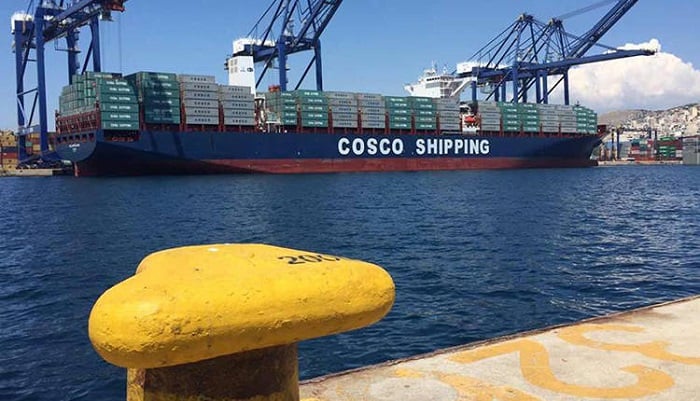Over the past several decades, China has experienced an exponential rise in its economic performance and has positioned itself as a leader in several industries and areas of economic activity.
As one of the great powers of the emerging multipolar order, China has also sought to play a more expansive role in international shipping and maritime commerce. Indeed, the Maritime Silk Road (MSR) is a key component of Beijing’s Belt and Road Initiative (BRI), designed to bolster China’s economy and geostrategic influence.
To this end, China has increased the size of its commercial fleet, leveled up its shipbuilding capabilities, and invested considerably in overseas ports and maritime infrastructure. By positioning itself as a key player in shipping and maritime commerce, China hopes to reap economic, political, and security rewards.
The importance of shipping to global trade and prosperity
Shipping is one of the central pillars of globalized trade and supply chains. Approximately 80 percent of all goods are transported by ship. This figure includes the most crucial goods to sustaining human life such as food, of which about 60 percent is transported by sea and only two percent by air.
The importance of maritime commerce is dramatically demonstrated by cases in which the busy international shipping lanes have been disrupted. For example, when a container ship blocked passage through the Suez Canal after running aground in 2021, economists estimated that $10 billion of daily trade was halted for six days.
As a result of its importance, big bucks are being made by companies that operate in shipping and the broader commercial maritime space. For governments, the maritime space is a crucial arena to secure economic, diplomatic, and security interests.

China’s growing shipping fleet
In August 2023, China overtook Greece as the country with the largest commercial fleet in terms of gross tonnage and fleet value owned. The growth of the Chinese commercial fleet is in part driven by the country’s status as the world’s largest exporter of goods since 2009 and second-largest importer.
China is regarded as the “world’s factory.” Recent estimates place China’s global manufacturing output at just over 28 percent. However, China’s manufacturing dominance is old news. Consumer demand is also growing. By 2027, China’s middle class is projected to amount to 1.2 billion people, approximately a quarter of the world’s total.
Naturally, China’s state-owned shipping companies are keen to capitalize on the delivery of these goods. “The core and essence of China becoming the world’s largest shipowner is because of the development of China’s economy,” Zhang Shouguo, the executive vice president of the China Shipowners’ Association told China News last year.

Ship construction and technology
According to Clarksons, Chinese shipbuilders now produce more than half of the world’s merchant tonnage annually, a dramatic increase from only five percent in 1999.
The Chinese shipbuilding industry’s ability to produce vessels quickly and in vast numbers has been bolstered significantly by government spending since the 2000s. According to analysis conducted by the Center for Strategic & International Studies, “State-driven efforts helped China undercut competition and glean market share from erstwhile global leaders.”
China may also secure a place at the forefront of maritime transport and shipping technology. In December 2023, it surprised the global shipping industry by unveiling a super-large nuclear container ship design at the Marintec marine expo in Shanghai. The KUN-24AP class concept was introduced by Jiangnan Shipyard, a subsidiary of the China State Shipbuilding Corporation.
The 24,000-container capacity ship, designed to use fourth-generation Molten Salt Reactor (MSR) technology for its propulsion and onboard services, has the potential to revolutionize maritime commerce. If a prototype is constructed, it could pave the way for a fleet of large nuclear-powered merchant vessels with a nearly zero-emissions operating footprint.
Overseas ports and infrastructure
China has acquired a substantial stake in a network of global ports that are crucial to international trade and the freedom of navigation.
When President Xi Jinping introduced the Maritime Silk Road, China had investments in 44 ports worldwide. Ten years later, China controls or manages ports and terminals at almost 100 sites in over 50 countries, encompassing every ocean and continent, with many positioned along the world’s most critical waterways.
According to analytical work conducted by the Council on Foreign Relations, “China’s heavy investment in the world’s most-connected ports highlights its strong influence over the supply chains of global trade…China’s leverage is in its varied degrees of investment and ownership in the world’s busiest and most-connected ports, which underpin the global flow of goods.”

Geopolitical competition
Beyond the obvious economic incentives behind the growth in Chinese shipping, there are also broader geopolitical factors to consider. As the wars in Ukraine and Gaza have demonstrated, international relations are increasingly defined by competition and instability. It is now generally accepted that the unipolar world order characterized by US hegemony is giving way to a multipolar world order defined by multiple “poles” of global power.
In the emerging multipolar world order, China is recognized as the second most powerful “great power” behind the US. The rise of China has been accompanied by an intensification of tensions between Beijing and Washington. Amid these rising tensions and increased strategic competition, shipping and the commercial maritime space are already becoming an important source of leverage and strength.
A higher stake in commercial shipping and infrastructure grants China greater economic and diplomatic leverage in its dealings with others. Additionally, some overseas ports can double as port facilities for Chinese military vessels, and the development of civilian container technology may have dual-use military applications in some cases, as is often witnessed in the aviation industry.



